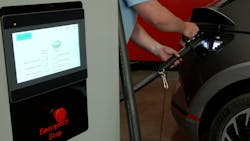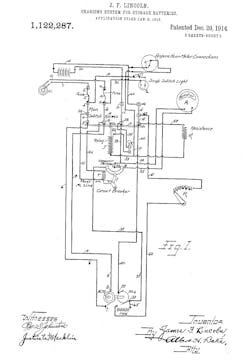Lincoln Electric Adapts Welding Technology for EV Charging Stations
Pumping electrons into a lithium-ion battery to power a car may not sound like a welding challenge, but it’s nearly identical to a technical challenge that the metal-joining industry solved decades ago, said Steve Sumner, vice president of global equipment at welding giant Lincoln Electric. And that challenge is making Lincoln Electric, a global manufacturer of welding equipment, a strong contender in manufacturing electric-car chargers.
At the heart of most Lincoln Electric welding tools is the Power Wave power supply, a device that controls the flow of electricity from the wall socket to the superheated tip of the metal-melting system. Ignore the melting metal part, and that power supply is nearly identical, mechanically speaking, to the DC fast chargers popping up in parking lots across the country.
“A welding power supply is high current, low voltage. A DC fast charger is low current, high voltage. But other than that, they’re very similar,” Sumner said. “We’re going to be writing a lot of new software, and we’ll be changing out a lot of hardware … but our clean room facility where we make all of our own PC boards, that factory is fully capable of making these new products.”
“We’re not a startup getting funded by venture capital,” Sumner said. “People who don’t weld every day need to learn who we are, but when they look at us, they’re going to see a company that’s been doing these sorts for things for a very long time.”
Sumner discussed the possibility of Lincoln jumping into EV charging in April at the Northeast Ohio Manufacturing for EV Conference at Kent State University, an event hosted by the Smart Manufacturing Cluster of Northeast Ohio. At the time, he said Lincoln had the technology to enter the market, but leadership wasn’t sure whether there was enough demand to justify a new product line, or whether it could offer something that the market needed.
Months of due diligence followed, and Lincoln officials saw fast-growing market demand, as well as frustration with the ruggedness of existing chargers. Vehicle chargers must be able to withstand extreme heat and cold and work reliably in ever“What we heard pretty frequently from a lot of customers, beyond the need for infrastructure for more charging, was the need for more reliable products, more rugged equipment,” Sumner said.
Other benefits that Lincoln hopes it can bring to the market include a global service network and a large engineering staff that can constantly work on new products. That clean room he mentioned earlier is also critical.
Lincoln makes its core power control systems in Cleveland. Last year’s Infrastructure Investment Act offers big incentives to building EV charging networks but contains requirements for domestically sourced parts, so the company’s made-in-America labeling could become a big advantage.
In the company’s news release Monday, Lincoln Electric Chairman and CEO Christopher L. Mapes said, “We believe Lincoln Electric’s proven power electronics and extensive domestic manufacturing capabilities could bring tremendous value to the DC fast-charge EV charger market. This exciting new initiative reinforces the long-term value we believe we can generate from our innovation, operational capabilities and R&D engineers as we seek to accelerate growth.”
Correction: Due to incorrect information from the company, an earlier version of this story credited Lincoln Electric Founder John C. Lincoln for having patented an electric vehicle charging system in 1914. It was Lincoln's brother and former Lincoln Electric Chairman James F. Lincoln who submitted that patent application.About the Author
Robert Schoenberger
Editor-in-Chief
LinkedIn: linkedin.com/in/robert-schoenberger-4326b810
Bio: Robert Schoenberger has been writing about manufacturing technology in one form or another since the late 1990s. He began his career in newspapers in South Texas and has worked for The Clarion-Ledger in Jackson, Mississippi; The Courier-Journal in Louisville, Kentucky; and The Plain Dealer in Cleveland where he spent more than six years as the automotive reporter. In 2014, he launched Today's Motor Vehicles (now EV Manufacturing & Design), a magazine focusing on design and manufacturing topics within the automotive and commercial truck worlds. He joined IndustryWeek in late 2021.


